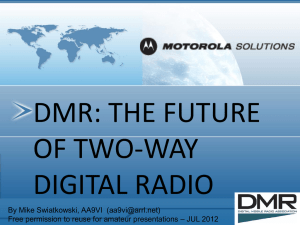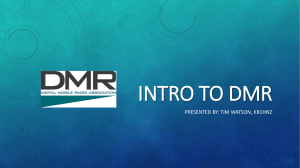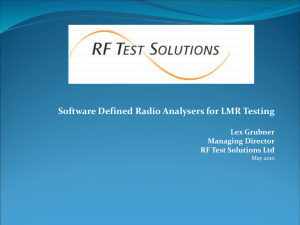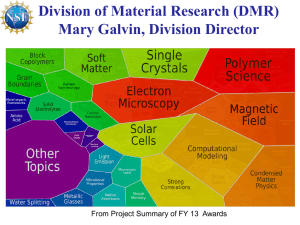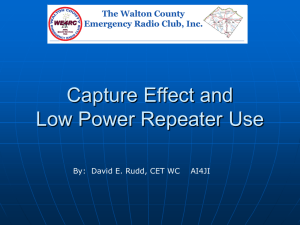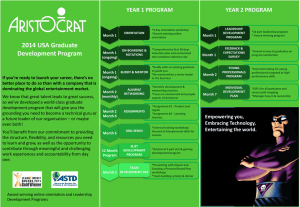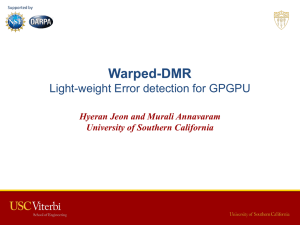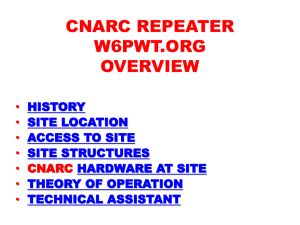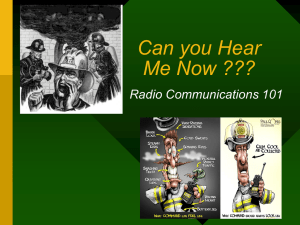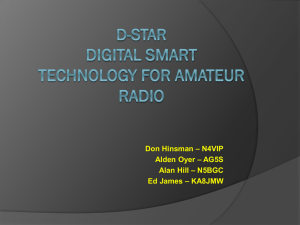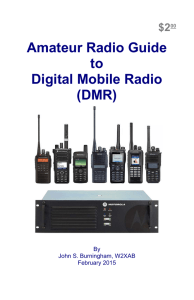the brief presentation we used at Dayton - DMR-Marc
advertisement
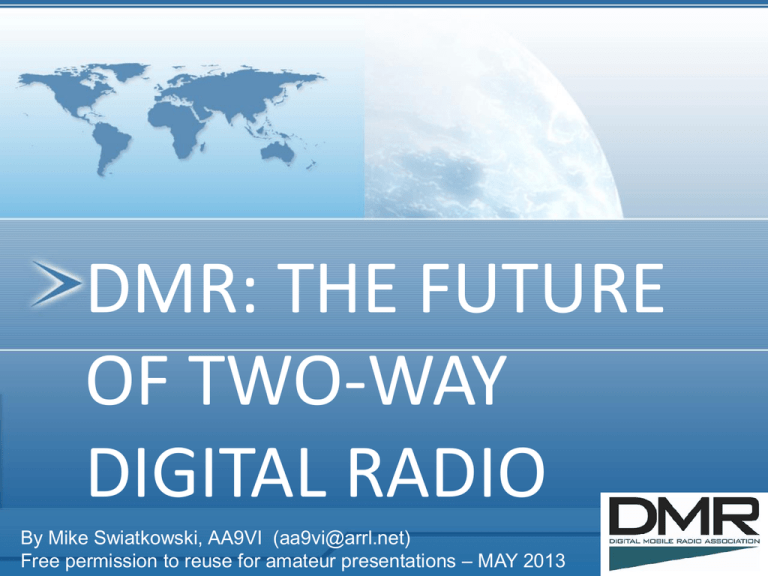
DMR: THE FUTURE OF TWO-WAY DIGITAL RADIO By Mike Swiatkowski, AA9VI (aa9vi@arrl.net) Free permission to reuse for amateur presentations – MAY 2013 Digital Mobile Radio An ESTI published worldwide standard Over a HALF DOZEN manufacturers of DMR radios Superior voice quality over older digital modes Longer battery life Supports multiple talk groups on one channel Supports data applications Commercial ETSI/TIA specs mean rugged performance over temperature and congested urban RF environments TWO Repeaters in One! ] Lower infrastructure cost, 1 box in rack TWO voice channels from one repeater Half the Channel Bandwidth fc - 12.5 fc fc + 12.5 fc – 6.25 fc fc + 6.25 Traditional Analog 25 kHz Channel Bandwidth DMR 12.5 kHz Channel Bandwidth 1 Channel 1 Repeater 2 Channels 1 Repeater More Spectrum Efficient than Older Digital Modes fc – 11.25 fc fc + 11.25 Guard Band as large as 10 kHz between channels Total BW= 22.5 kHz fc - 6.25 fc fc + 6.25 No Guard Band between 2 channels Total BW= 12.5 kHz Better Signal Quality No hiss, popping, or static Better RF range than older digital technologies Forward Error Correction and Cyclic Redundancy Check coders Better Audio Quality Listen for yourself. DMR does sound better than older digital technologies. Longer Battery Life Older Digital Modes (FDMA) DMR (TDMA) “For each hour of usage the TDMA radios show between 19% and 34% less battery capacity is required than for the FDMA models.” “40 percent improvement in talk time in comparison with analogue radios “ http://dmrassociation.org Data and Voice at the Same Time Slot 1 Voice Slot 2 GPS Location (or second channel voice when not sending GPS data) Give your location WHILE talking! IP Site Connect 1 or 2 slots (channels) Link statewide/regionwide systems Peer Peer Bridging Hardware Peer Master Peer Peer Master Master Peer Dynamic Mixed Mode: First in – First Out Analog Analog OR Slot 1 TDMA Slot 1 TDMA Slot 2 TDMA Slot 2 TDMA Repeater dynamically detects the type of input IP site connect currently not supported in DMM This is a stand-alone repeater option only. Free Text Messaging Send to one person, or a group of people. - Weather Alerts - Club Meetings - Announcements Monochrome Radios XPR6550 and cost reduced XPR3500 portables XPR4550 Mobile Make sure the radio is UHF1 (403-470 MHz) not 450-512 MHz (commercial band). New Color Radios Now Available XPR7550 Portable XPR5550 Mobile SL7550 (slim line, looks like cell phone) DMR Growth Motorola Amateur Radio Clubs and other private XPR8300/8400 and MTR3000 repeater owners 160 site network in USA, Germany, Australia, South Africa, New Zealand, Spain, Switzerland, Austria, Canada, Finland, Sweden, Italy, Mexico, and the UK. 100% Pure Digital. Voice and text messaging supported. Weekly nets to discuss technical issues More than 2700 registered users To register or learn more http://dmr-marc.net There you will also find links to our bridge partners, our Yahoo group and other programming aids. Talk Groups Increase Capacity! Time Slot 1, Talk Group 3 – Native English speakers (USA, Canada, Australia, New Zealand, South Africa, and U.K.) Time Slot 1, Talk Group 1 – Primary English language countries to secondary English speaking Europeans Time Slot 2, talk group 2 – Local Repeater QSOs. Time Slot 2, first 4 digits of state ID (KS = 3120) for statewide linked TS2 systems. Also, country talk groups are 3 digits (Canada = 302) Be courteous and use the local time slot for local repeater QSOs and don’t monopolize the linked network time slot 1 if you don’t have to. Talk Group Mappings TG1, TS1(World) - Saturday Nets - Calls to second language English speakers - Don’t use for UK-> USA or Australia-> Canada, etc. TG3, TS1 (NAm/English) - Calls to native English speakers - Share with other users! - Use local/regional TG/TS when possible Other Talk Groups ID Scheme DMR supports 16777215 IDs. We ask max 2 IDs per person. You can reuse same ID on multiple radios that you use-> Recommended! 8-digits: Admin tools and resources 7-digits: Subscribers (mobiles and portables) 6-digits: Repeaters 4-digits: Regional Talk Groups 3 digits: Country Talk groups Examples: Subscriber IDs are 7 digits: XXXYZZZ where XXX= Country Y= State/Province ZZZ= Sequentially assigned subscriber number Repeater IDs are 6 digits: XXXYWW where XXX= Country Y= State/Province WW= Sequentially assigned repeater number Common Courtesy ALL RADIOS MUST HAVE A VALID 7-DIGIT DMR ID from our website http://dmr-marc.net, Under “Contact Us” Radios without an official ID should not be on the system. Period. Do not make up your own ID. Do not key up on TS1 and blow into mic to test your radio. You key up 100+ repeaters and that is annoying to all of us who listen. Do radio tests on TS2 with a voice ID. You must identify your callsign just like you did in the past on an analog repeater per FCC rules. Status of C-bridge Links master repeaters (groups of 15-20), and bridges Mfr: Rayfield Communications Springfield, MO We have 6 masters (Chicago, S. NH, S. FL, Montreal, Toronto, and Brisbane ), and 14 bridges connected to the DMR-MARC C-bridge and the DMR-MARC-IL C-bridges We have connections to multiple bridge partners including DCI (WA), NC-PRN, NorCal, AZ TRBO, WØPM (MO), KØUSY (KS), Georgia DMR, SF TRBO, N2JTI (NJ), N2NSA (NY), N. CO, Denver, Vancouver) Current Development Projects TRBO to APRS-IS. Currently working on FCC ID compliance. Automated severe weather warnings to local time slot on radio Join our MOTOTRBO Yahoo group to help! Ham Friendly Dealers Rayfield Communications, contact John Rayfield, Jr 800.743.9711. Mention you are part of MARC and inquire about ham pricing. Sandy’s Communications in Mission Hills, CA E-Bay or Local Dealer TRBO DMR radios are DMR –and- Analog monoband Mobile: XPR4550 UHF band 1 (403-470 MHz) 2545W, Portable: XPR6550 UHF band 1 Customer Programming SW C-Bridge Last Heard/Net Status Acknowledgements NE1B and KBØZZT for the DMR Growth Stats Rayfield Communications- C-Bridge ElComPlus – SmartPTT WØWJB – Network Hosting, 2012 Hamvention Booth K6EH- Webpage Hosting DMR-MARC members for 2013 Hamvention Booth Backup Slides GW3TRBO – Who’s on Where?
